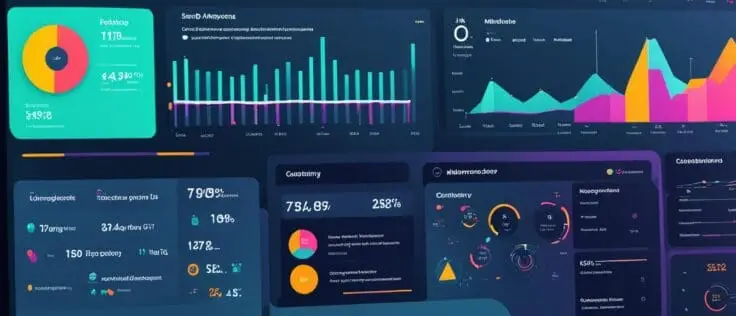In the vanguard of technological progression, AI-powered customer relationship management (CRM) heralds a new epoch for businesses seeking to refine interaction strategies with clientele. This innovative approach enables organisations to automate and tailor customer experiences with unprecedented precision, propelling customer service into a realm of effortless convenience and customisation.
The integration of artificial intelligence CRM systems ushers in sophisticated analytical tools capable of dissecting complex consumer data, leading to smarter, data-driven business decisions. They are not just smart CRM solutions, but they are visionary systems designed to anticipate customer needs and craft individualised communication paths. This amalgamation of technology ensures heightened engagement and loyalty, thereby solidifying enduring client relationships.
With customer experience automation taking the helm, companies now deliver responsive and personalised support around the clock. Businesses in the United Kingdom are thus poised to redefine consumer interactions, delivering seamless and smartly customised service through the might of artificial intelligence.
The Advent of AI in Modern CRM Systems
The landscape of business-client relations has undergone a remarkable transformation with the evolution of CRM. The advent of artificial intelligence within these systems marks a pivotal shift from traditional, manual methodologies to a sophisticated nexus of automated capabilities. As organisations in the United Kingdom grapple with the ever-growing need for timely and incisive customer insights, the rise of artificial intelligence in CRM provides an ingenious solution to foster and elevate personalised customer interactions.
Rooted in the innovation of machine learning, AI serves as the catalyst for dynamic CRM data analysis, streamlining processes and instigating strategic decision-making. Through predictive analytics and natural language processing, AI amplifies the functionality of CRM systems, adroitly automating workflows to engender profound customer insights. This significantly improves efficiency – a nuanced touchpoint that resonates with consumers’ mounting expectations for tailor-made experiences. At the forefront of this revolution stands OneAI, an exemplary platform that arms businesses with transformative tools, tackling the human-related challenges inherent in CRM productivity with finesse.
Tools and features such as automation and multilingual support, integral to platforms like OneAI, are the harbingers of an agile CRM environment. These mechanisms not only harmonise communication across diverse demographics but also proactively address the intricacies of customer preferences. It is this striving towards excellence in CRM that dictates the need for an interconnected system, where artificial intelligence seamlessly melds with machine learning to craft bespoke customer experiences and simplify intricate analyses.
In summary, the integration of AI into CRM systems ushers in an era of refined business intelligence. It opens a conduit to enhanced relationships between businesses and clients, as AI-driven CRM evolves into the new standard of bespoke customer service, shaped by the insightful nuances drawn from data and the utilisation of intelligent algorithms – a testament to the innovative spirit that defines the modern age of customer relationship management.
Discovering the Benefits of AI-Powered CRM
In the arena of contemporary business, the benefits of AI-powered CRM are redefining the boundaries of customer engagement and operational proficiency. By embracing the intricate marvels of artificial intelligence, companies in the United Kingdom are witnessing a paradigm shift in client relations management. This shift is embellished with the promise of tailored customer service experiences, bolstering the calibre of client-company interplay.
Foremost among the myriad benefits is the enhancement of data analysis. With AI at the core of CRM systems, businesses gain unparalleled clarity into customer behaviours and tendencies. This data-driven approach, enriched by predictive analytics in CRM, provides a well-spring of insights that inform customer-centric strategies with precision and agility. The ability to harness nuanced customer details translates into sophisticated marketing campaigns, fostering impactful customer journeys.
Additionally, the integration of AI automates and refines decision-making processes. From lead qualification to nurturing, organisations experience an acceleration in tasks traditionally marred by latency. This pace is matched by the deployment of automated customer service, ensuring that relationships are maintained and enhanced without the constraints of time. The customer interaction is no longer a static art; it’s a dynamic craft tailored across myriad channels to resonate with the diverse needs of modern consumers.
Such technological integration furthers the pursuit of operational efficiency. Routine and laborious tasks are deftly automated, poising staff to deploy their talents towards strategic and creative endeavours. Consequently, AI-driven sales and marketing efforts are optimised, injecting velocity and effectiveness into campaigns that target the heart of customer needs. This shift not only amplifies productivity but also fosters ingenuity within teams, liberating them from the drudgery of repetitive work.
Whilst the adoption of AI-driven CRM tools promises an expansive suite of benefits, it punctuates the importance of addressing challenges that may arise, such as considerations surrounding data privacy and security. Despite these concerns, the virtues of implementing AI within CRM systems remain undeniably attractive, charting a course for revenue growth and enriched customer insights. It acts as a beacon for businesses navigating the complex seas of digital transformation and customer satisfaction.
Real-time Personalisation and Predictive Analytics
At the cutting edge of customer engagement lies the compelling force of real-time personalisation, propelled by the advancements in predictive analytics in CRM. As UK businesses adapt to a continually evolving market landscape, the capability to not merely respond to, but anticipate customer needs becomes invaluable. Artificial Intelligence (AI) crystallises this capability through dynamic CRM data analysis, generating profound insights and fostering individualised customer experiences.
By scrutinising purchasing patterns with predictive analytics, CRM systems are recalibrated to predict future behaviours with impressive accuracy, allowing companies to skate to where the puck is going to be, not where it has been. This prescient knowledge informs and tailors marketing strategies, ensuring that every touchpoint is both relevant and resonates with each customer’s unique preferences.
Moreover, this technology ushers in an era of dynamic customer segmentation, where customer groupings are not fixed, but fluid, adapting in real-time to shifts in consumer behaviour and data. Such segmentation sharpens the precision of targeted campaigns, improving the efficiency of marketing spends and bolstering conversion rates. Organisations can now navigate the marketplace with a more nuanced compass, charting paths that are defined by the collective motion of their client base.
The advent of AI in CRM systems does not stop at analysis; it extends to action. By automating personalised communication, businesses can scale their bespoke messaging, ensuring that each customer feels singularly acknowledged and valued. AI acts as the master tailor, stitching together experiences from a swath of data points to reflect the perfect fit for each customer’s expectations and preferences.
In conclusion, the integration of real-time personalisation and predictive analytics within CRM systems forms a bedrock upon which businesses can sculpt a comprehensive, data-driven sales strategy. This intelligent use of technology empowers them to fine-tune their interactions, converting prospects to loyal customers with seamless precision, thereby shaping the future of business-consumer relationships in the United Kingdom.
Driving Efficiency Through CRM Automation
In an age where CRM automation is synonymous with efficiency, United Kingdom businesses are harnessing the power of artificial intelligence CRM to redefine customer service. Automation, powered by machine learning in CRM, is not just a trend—it’s an intelligent business strategy that significantly uplifts operational productivity and enhances the customer experience.
Utilising machine learning in CRM, modern enterprises are deploying AI-powered chatbots and virtual assistants to address customer enquiries with remarkable precision. These digital assistants are accessible around the clock, breaking down temporal barriers to customer engagement. The incorporation of natural language processing allows these systems to understand and interact in human-like conversations, ensuring that customers receive swift and relevant assistance.
Moreover, AI’s astute capability in sentiment analysis offers businesses the chance to process customer feedback in real-time. Such immediate understanding enables companies to promptly react to customer sentiments, fine-tuning services for an optimised experience. This agile responsiveness not only serves the customer but also provides invaluable insights for service enhancements.
However, as we steer towards greater reliance on automated customer service, it is imperative to ponder the challenges lurking beneath these technological advancements. Prioritising data quality is paramount when integrating AI with existing CRM platforms. Furthermore, businesses must negotiate potential technological constraints and compatibility issues, ensuring that the CRM infrastructure seamlessly coalesces with emergent AI functionalities.
Embracing CRM automation does not merely mean adopting new technology; it encapsulates a holistic approach where the synergy between human expertise and AI spurs transformative customer service encounters. As UK businesses voyage through the vast seas of digital innovation, the integration of CRM automation stands as a lighthouse, guiding them towards enhanced customer satisfaction and operational excellence.

Tapping into Enhanced Customer Insights with AI-Powered CRM
In the modern commerce theatre of the United Kingdom, AI-powered CRM systems are trailblazers, proffering enhanced customer insights with unprecedented depth. These pioneering systems enable businesses to meticulously track and measure interactions across diverse platforms. Through such comprehensive analysis, they discern patterns and preferences that are pivotal in sculpting customer experience par excellence. The predictive analytics for sales forecasting ingrained in these AI tools are instrumental in foreseeing market tendencies, thus informing strategic decisions that underscore campaign efficacy and bottom-line fortune.
Embodying the subtleties of effective communication, AI-powered sentiment analysis remains a cornerstone of understanding customer feedback. This technology interprets the emotional undertones and pulses of dialogue, allowing for a keener comprehension of the consumer psyche. The resultant insights facilitate the crafting of automated marketing campaigns, tailored with precision to echo the aspirations and demands of the customer landscape. In the vanguard of service provision, AI-enabled customer service becomes the lynchpin of a responsive and empathetic support ecosystem, fostering satisfaction and loyalty.
Yet, the realms of AI in CRM extend beyond mere analysis and application. Ethical concerns command considerable attention, particularly ensuring transparency in AI’s decision-making faculties and safeguarding against potential biases. It is imperative that businesses fortify their AI strategies with principles of fairness and clarity, thereby reinforcing consumer trust and maintaining the integrity that underpins the brand-customer relationship. Thus, as UK ventures increasingly interweave AI within their CRM frameworks, a commitment to honouring these ethical tenets enshrines their resolve to embrace innovation responsibly.






